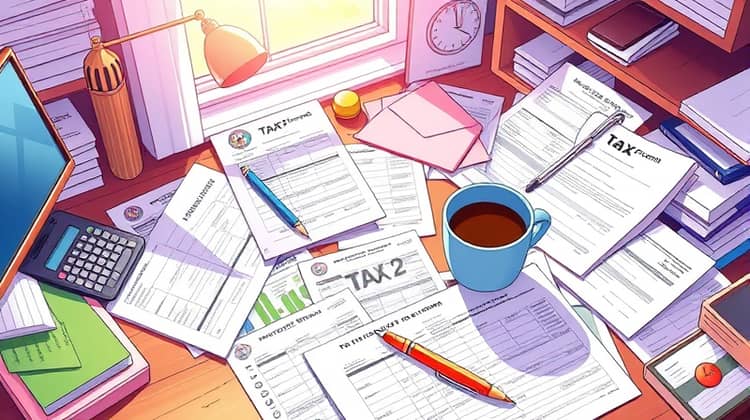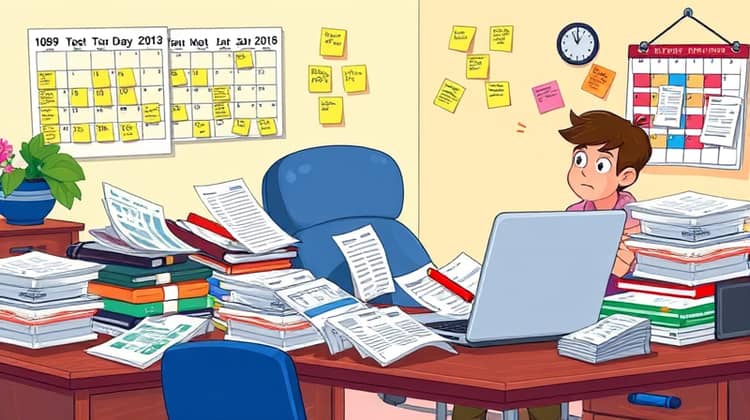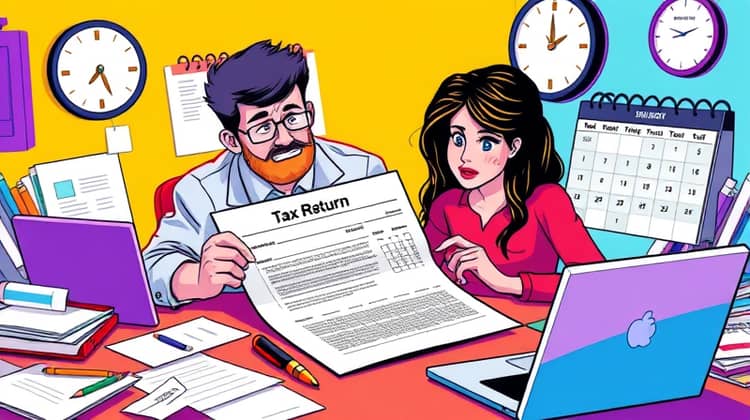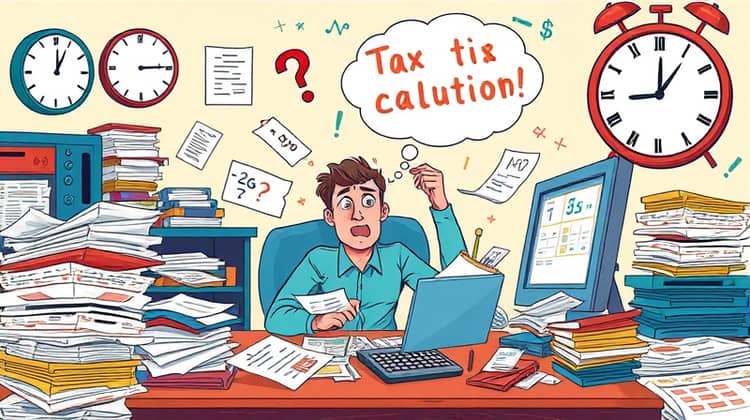Filing taxes can be a daunting task, and it's easy to make mistakes that could lead to delays or penalties. Understanding common pitfalls can save you a lot of trouble down the road. This article aims to highlight typical tax filing mistakes that individuals often encounter and provide guidance on how to avoid them.
Many people feel overwhelmed during tax season, leading to rushed preparations and inaccurate submissions. By taking your time and being methodical, you can minimize the risk of errors. Make sure you have all necessary documents and information at hand before starting the filing process.
Moreover, it's essential to stay informed about the tax laws and regulations applicable to your situation. They can change frequently, impacting your overall tax obligations. Also, the consequences of errors in your tax return can go beyond financial loss; they can impact your future dealings with the IRS.
1. Double-check Your Personal Information

One of the most fundamental and easily overlooked aspects of tax filing is ensuring your personal information is accurate. This includes your full name, Social Security number (SSN), and address. Mistakes in these areas can lead to significant delays in processing your return and may even trigger audits.
When you are filing taxes, it is vital to verify that your name is spelled correctly as it appears on your Social Security card. Any discrepancies between what you report and what the IRS has on file can result in your refund being delayed or denied. Avoiding these basic errors is a crucial first step in ensuring a smooth filing process.
- Check the spelling of your name against your Social Security card.
- Verify your Social Security number is correct.
- Ensure your address matches the one on your latest tax return.
Taking the time to confirm your personal information can help avoid the more complicated consequences of mistakes. Once you confirm accuracy, you can confidently move to the next steps in the filing process.
2. Ignoring Tax Forms

Tax filing can be complex, and with the multitude of forms available, it is easy to overlook one or more essential documents. Each tax situation is unique and requires specific forms to report income, deductions, and credits correctly.
One common mistake is forgetting to include documents like W-2 forms from employers, 1099 forms from freelance work, or any other relevant income documentation. Missing these forms can lead to underreporting your income, which can have serious repercussions.
Always review the list of tax forms you need before beginning your filing process. Make sure to gather all documents required for your particular tax situation before you sit down to file.
3. Overlooking Deductions and Credits

Deductions and credits can significantly reduce your taxable income and overall tax bill. However, many taxpayers overlook potential deductions and credits that they may qualify for, resulting in higher tax bills than necessary.
Forgetting to include these benefits can stem from a lack of awareness; hence, it's crucial to research what deductions and credits are available each tax season. You may qualify for educational credits, home office deductions, or medical expense deductions, among others.
Make a comprehensive list of all potential deductions and credits before filing your taxes.
- Search for all available tax deductions specific to your employment status.
- Understand various credits that apply to your situation, such as child tax credits.
- Keep receipts and documents that can support these deductions and credits.
By being thorough with deductions and credits, you can effectively reduce your tax liability and potentially increase your refund.
4. Filing Late or Not at All

Timely filing is critical in the tax process. Many taxpayers wait until the last minute or forget entirely, leading to penalties and interest charges on unpaid taxes. It's essential to file on or before the due date to avoid incurring these additional fees.
If you anticipate that you cannot file on time, consider filing for an extension. This does not excuse you from paying any tax due, but it does give you additional time to prepare your return consequently.
5. Incorrectly Reporting Income

One of the most common mistakes during tax season is misreporting income. This could occur due to misunderstanding what counts as taxable income or failing to report all income sources accurately. It's crucial to report all income, from full-time jobs to bonuses, freelance work, and investments.
Ensuring that every income stream is documented correctly is essential to avoid issues with the IRS. The agency receives copies of all tax documents, so discrepancies can easily lead to an audit.
- Use bank statements to verify all sources of income.
- Have documents like 1099s and W-2s ready for reference.
- Ensure you include side gig income and other revenue streams.
Reporting income incorrectly can lead to severe consequences, including penalties and interest charges, so always double-check your figures.
6. Incorrect Filing Status

Selecting the correct filing status can significantly impact your tax return. Many individuals make the mistake of choosing the wrong filing status, which can result in incorrect tax calculations and missed benefits.
The IRS recognizes several filing statuses, including single, head of household, married filing jointly, and married filing separately. Make sure you understand the benefits and requirements for each status, and choose accordingly.
7. Forgetting to Sign and Date

One of the simplest yet most commonly made mistakes is forgetting to sign and date your tax return. A failure to sign can result in your return not being processed, causing delays and potential penalties.
Ensure that both spouses sign the document if you are filing jointly, and remember that electronic filing also requires your electronic signature.
8. Not E-filing or Using Direct Deposit

With technology continually improving, e-filing has become the easiest and quickest way to file your taxes. Some still opt for paper filing due to habit or lack of knowledge about the electronic process, resulting in unnecessary delays in processing their returns.
Using direct deposit for refunds also speeds up the receipt of your funds. You can avoid the hassle of paper checks and the delay that accompanies mailing.
9. Incorrect Bank Account Information

If you're opting for direct deposit, make sure to double-check your bank account information. Incorrect account numbers can delay your refund or result in payments being deposited in the wrong account, leading to considerable inconvenience.
Taking the time to verify your banking details before submitting can save you the headache of tracking down your funds after a mistake.
10. Failing to Keep Records

Proper record-keeping is a vital aspect of tax preparedness. Many people fail to keep their receipts and documentation organized, making it difficult to substantiate claims in the event of an audit.
Keep records for at least three years, including income documents, receipts for major purchases, and any relevant tax forms, to be prepared for any inquiries the IRS may have.
11. Miscalculations

Arithmetic errors are among the top reasons for tax return adjustments. Sometimes, people rush through their calculations or rely too heavily on their calculators without double-checking their figures.
Attention to detail is critical in tax filing to avoid penalties and inaccurate amounts owed or overpaid. Consider using tax software that can help mitigate basic math mistakes through its built-in functions.
12. Not Asking for Help

Many individuals hesitate to seek assistance when they encounter the complexities of tax filing. It's essential to reach out for help if needed, whether from a trusted friend, tax professional, or an online tax support service. Doing so can provide you with insight and save you from potentially costly mistakes.
Professional tax preparers can offer invaluable advice and ensure that you're in compliance with all tax laws, ultimately leading to a more favorable return outcome.
Conclusion

Navigating the world of taxes can be challenging, especially with so many potential pitfalls along the way. Understanding common mistakes and knowing how to avoid them can significantly streamline the tax filing process, ensuring that you meet your obligations without unnecessary stress.
Tax filing is not just about filling out forms and sending them off; it's about documentation, timing, and understanding your unique financial situation to maximize the benefits available to you.
Take the time to educate yourself and pay attention to detail as you prepare your taxes, and don’t hesitate to seek assistance if needed. By avoiding these common tax filing mistakes, you can conquer tax season with confidence.














